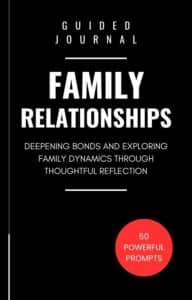Family is the cornerstone of our lives, providing support, love, and a sense of belonging. Yet, in the hustle and bustle of daily routines, we often miss the opportunity to truly engage with our family members on a deeper level. Journaling together as a family can be a transformative experience that not only strengthens bonds but also opens up new avenues for communication and understanding. To help you embark on this rewarding journey, we’ve compiled a diverse list of 50 journal prompts designed to explore various facets of family life.
These prompts encourage each family member to share their thoughts, memories, and feelings, facilitating a richer dialogue between generations and siblings. Whether it’s recalling cherished memories, expressing gratitude, or planning future adventures, these journal entries can become a treasured family keepsake that reflects the unique spirit and love of your family. The prompts are crafted to cater to all ages, ensuring everyone can participate and contribute to the family’s storytelling tapestry.
Understanding Family Relationships
Family relationships are among the most significant and influential connections in our lives. They form the backbone of our social structure and deeply affect our individual development, emotional health, and social behavior. In this article, we’ll explore what family relationships are, their various types, and how they impact our lives. By providing clear examples, we aim to help you better understand these complex dynamics and appreciate the roles they play in shaping who we are.
What Are Family Relationships?
Family relationships refer to the connections between members of a family, bound by blood, marriage, or emotional ties. These relationships encompass a range of dynamics including those between parents and children, siblings, extended family members like grandparents, aunts, uncles, and even relationships formed through marriage, such as in-laws. Each of these relationships carries its own unique set of expectations, challenges, and rewards.
Types of Family Relationships
Parental Relationships: These are typically the first relationships we form and are crucial in shaping our early experiences and emotional development. Parents or guardians provide care, guidance, and support, setting the foundation for our sense of security and self-worth.
Example: A child learning to ride a bike with encouragement from a parent, building trust and confidence.
Sibling Relationships: Relationships between brothers and sisters are often our longest-lasting family bonds. They can be competitive, supportive, and deeply influential in social development.
Example: Siblings teaming up to complete household chores, learning cooperation and negotiation skills.
Extended Family Relationships: These include grandparents, aunts, uncles, and cousins. Extended family can offer a broader support network, cultural heritage, and generational wisdom.
Example: Cousins gathering at a family reunion, sharing stories and building a sense of family history and belonging.
Marital and In-Law Relationships: These relationships are formed through marriage and can include spouses and their family members. They expand our family circle and bring new dynamics.
Example: A person learning to celebrate their spouse’s family traditions, adapting and integrating into a new family environment.
Impact of Family Relationships on Personal Development
Family relationships influence nearly every aspect of our lives—from our earliest socialization practices to our emotional responses and conflict resolution skills. They can provide:
Support and Security: Strong family bonds give us a base of security from which to explore the world. This supportive backdrop can be crucial during times of personal crisis or challenge.
Values and Beliefs: Families play a critical role in transmitting cultural and social values, shaping our beliefs, behaviors, and attitudes.
Emotional Skills: Interacting with family members teaches us about empathy, patience, and emotional regulation, skills that are vital in all areas of life.
Life Skills: Practical life skills, from financial management to household tasks, are often passed down within families, preparing us for independent living.
Navigating Challenges in Family Relationships
Not all family relationships are positive or nurturing. Conflicts, misunderstandings, and even estrangement can occur, impacting our emotional well-being. It’s important to address these issues constructively, through open communication, seeking understanding, or sometimes through professional counseling. Healthy family relationships are marked by respect, love, and the ability to resolve conflicts in a constructive manner.
The Significance of Nurturing Family Relationships
The quality of our family relationships can significantly impact our happiness and life satisfaction. By investing time and effort into building and maintaining these relationships, we create a supportive network that enhances our resilience and enriches our lives. Whether it’s through regular family meals, shared activities, or open conversations, strengthening these bonds can provide lasting benefits, making each family member feel valued and supported. Understanding and nurturing these relationships is key to building a fulfilling and harmonious life.

The Power of Journaling in Strengthening Family Relationships
Journaling is a deeply personal practice that involves the regular recording of thoughts, feelings, and experiences. While often seen as an individual activity, journaling can also be a powerful tool for enhancing family relationships. In this guide, we’ll explore what journaling is and how it can transform the dynamics within your family, fostering deeper connections and understanding among its members.
What is Journaling?
Journaling is the act of writing down your thoughts, experiences, and emotions on a regular basis. This can be done in a notebook, a digital app, or any medium that allows for reflective writing. The key aspect of journaling is its reflective nature; it’s not just about recording events, but also about understanding and interpreting them. When applied to family relationships, journaling becomes a shared practice where each member expresses their feelings and insights, leading to greater empathy and communication within the family.
Benefits of Journaling for Family Relationships
Enhanced Communication: Journaling can open new channels of communication in your family. By writing down thoughts and feelings, family members can express things they might find difficult to say out loud. This can be particularly beneficial for expressing appreciation, resolving conflicts, and understanding different perspectives.
Building Empathy: When you read about the experiences and feelings of other family members, you gain insights into their emotional states and viewpoints. This can help you develop a deeper empathy for them, understanding their reactions and behaviors in a more nuanced way.
Creating a Family History: Over time, the journals of family members become a valuable archive of family history. They capture the family’s evolution, important milestones, and daily life, providing a legacy that can be cherished by future generations.
Stress Reduction: Journaling can be a therapeutic activity, helping individuals manage stress and anxiety. When family members use journaling as a way to express their frustrations or concerns, it can help them work through negative emotions healthily and constructively.
Strengthening Bonds: By committing to regular journaling and sharing sessions, your family can establish a routine that strengthens bonds. These sessions can become a safe space where everyone feels heard and valued, reinforcing the family unit.
How to Implement Journaling in Your Family
Set Aside Time for Journaling: Choose a regular time each week for everyone to sit down and write. This could be a quiet Sunday afternoon or a few minutes each evening.
Create a Safe Space: Make it clear that the journals are a non-judgmental space where everyone can express themselves freely. Respect for each person’s privacy and feelings is crucial.
Share and Discuss (If Comfortable): Periodically, you might encourage family members to share entries with one another. This could be done during family meetings or informal gatherings. Sharing is optional but can be incredibly enriching.
Use Prompts: Sometimes, starting with a blank page can be daunting. Use prompts to get the thoughts flowing. These can be specific (“Write about a time you felt proud of a family member”) or open-ended (“How are you feeling today?”).
Encourage Creativity: Journaling doesn’t have to be only about writing. Encourage your family members to include drawings, collages, or other creative elements in their journals.
Taking the First Step
Starting a family journaling practice might seem challenging at first, but the benefits it can bring to your family relationships are immense. By providing a platform for expression and reflection, journaling can help you and your family understand each other better, resolve conflicts more effectively, and build a stronger, more empathetic family unit. Why not start this transformative journey today and see how much closer you can grow as a family?

Journal Writing Prompts for Family Relationships
- What are three things you appreciate about each family member?
- Describe a favorite memory involving the entire family. Why is it special to you?
- Write a letter to a family member you haven’t talked to in a while. What would you like to say?
- What is one goal you would like to achieve as a family in the next year?
- Reflect on your role in the family. How do you feel about it, and would you like to change it?
- Imagine a day in the life of another family member. What do you think are their biggest challenges?
- Discuss a recent family conflict. What could have been done differently by all parties?
- What strengths do you bring to your family?
- What tradition does your family have that you love or find challenging?
- Create a new family tradition and describe it. What makes it special?
- What’s a lesson you’ve learned from a family member that has stuck with you?
- Write about how someone in your family has changed in the past year and how you feel about it.
- How can your family make communication better? Share specific ideas.
- Describe a time when a family member surprised you in a good way.
- What are some ways your family handles stress and stays strong together?
- Share a time when your family came together to solve a problem.
- What are some favorite foods that your family enjoys together? Why are they special?
- Write about your last family vacation. What moments stood out?
- How does your family celebrate successes and achievements?
- What is something you wish your family knew about you?
- Describe how your family handles disagreements. What methods are effective?
- What is a fond memory of a family member who is no longer with us?
- How do you show love and appreciation to your family members?
- What cultural aspects are important in your family? Discuss their significance.
- What do you hope to teach your own children about family?
- Write about a time when your family’s support made a difference in your life.
- How has your understanding of family changed as you have aged?
- What activities do you wish to do more of with your family?
- Share your thoughts on each family member’s personality and how they complement each other.
- What is a challenging aspect of your family dynamics, and how do you cope with it?
- How do you contribute to making your family a happy one?
- Recall a hilarious moment your family still laughs about today.
- What are some goals you have for your family? How can you work together to achieve them?
- Write a note of gratitude to each family member and share why you are thankful for them.
- How does your family celebrate the major holidays? What would you change?
- Describe the best advice you have received from a family elder.
- What is something your family does together regularly that strengthens your bond?
- Reflect on a difficult period your family went through and how it was resolved.
- What are your hopes and dreams for your family’s future?
- How do you and your family members share responsibilities at home?
- Discuss how changes in the family (like a new baby or a marriage) affected everyone.
- What is your favorite family photo, and what’s the story behind it?
- Describe a family outing that didn’t go as planned but still turned out to be memorable.
- How does your family support each other’s individual interests and hobbies?
- What lessons do you want to pass on to the next generation of your family?
- How does your family make decisions together?
- What is one thing you admire about each family member’s approach to life?
- Discuss how your family has influenced your personal values.
- What qualities do you appreciate in your family’s culture or heritage?
- Imagine your family ten years from now. What do you hope has stayed the same? What do you hope has changed?
Download Printable Journal Prompts (PDF) >>
Guided Journal for Family Relationships
50 Writing Prompts for Deepening Bonds and Exploring Family Dynamics Through Thoughtful Reflection

Introducing the Guided Journal for Family Relationships—your family’s new companion in the journey towards deeper understanding and stronger bonds. Designed with love and care, this journal features 50 carefully crafted prompts that will guide your family through a variety of reflective exercises, ensuring every member can participate in meaningful ways. Whether it’s recalling cherished memories, setting shared goals, or expressing hidden feelings, this journal turns every page into a step closer to heartfelt connections.
Why Choose This Guided Journal?
Build Stronger Connections
Each prompt in the journal is a doorway to revealing conversations and undiscovered aspects of each family member. From appreciating individual qualities to acknowledging the challenges each person faces, this journal helps build empathy and understanding within the family unit.
Preserve Precious Memories
Journaling as a family allows you to document life’s precious moments and preserve them for future generations. With prompts like describing favorite family vacations or recounting memorable family outings, each entry becomes a cherished keepsake.
Enhance Communication
Communication is the cornerstone of healthy family relationships. This journal encourages open dialogue by prompting discussions on how family members can improve communication, resolve conflicts, and support each other’s individual interests and hobbies.
Promote Personal and Collective Growth
Reflect on personal roles within the family, discuss the evolution of relationships, and plan for future aspirations. This journal not only focuses on personal growth but also on how the family as a whole can evolve and flourish together.
Features and Benefits
- 50 Engaging Prompts: From simple questions that spark joy to deeper inquiries that provoke thoughtful responses, each prompt is designed to cater to different age groups and preferences, making it inclusive for all family members.
- High-Quality Design: The journal is crafted with a durable cover and high-quality paper that makes writing a pleasure. The lay-flat design ensures that writing is comfortable for everyone, from young children to elderly family members.
- Thoughtful Gift Idea: Perfect for holidays, family reunions, or as a thoughtful gift to encourage family bonding, this journal is a meaningful investment in your family’s future.
Sample Prompts to Inspire Your Family
- Appreciation: “What are three things you appreciate about each family member?”
- Memory Lane: “Describe a favorite memory involving the entire family. Why is it special to you?”
- Open Letters: “Write a letter to a family member you haven’t talked to in a while. What would you like to say?”
- Future Goals: “What is one goal you would like to achieve as a family in the next year?”
- Role Reflection: “Reflect on your role in the family. How do you feel about it, and would you like to change it?”
The Guided Journal for Family Relationships is more than just a book; it’s a tool for connection, a catalyst for communication, and a treasure trove of shared memories. It’s designed to bring families closer, encourage mutual understanding, and foster an environment where every member feels valued and heard. Start this transformative journey with your family today, and watch as your bonds deepen and your collective story unfolds, page by page.
Journaling as a family offers a unique opportunity to grow closer and deepen your understanding of one another. The 50 prompts provided are just the beginning of what could become an ongoing tradition, enabling each family member to express themselves and celebrate the familial ties that bind. As you each take the time to respond to these prompts, you’ll likely discover new facets of each other’s personalities, revisit fond memories, and build a stronger family unit.
Reflecting on these journal entries over time will not only provide insight into each other’s evolving thoughts and feelings but also serve as a historical record of your family’s journey. Whether it’s daily, weekly, or as often as you can manage, sitting down to journal together can be a meaningful ritual that strengthens the bonds you share. Embrace this chance to communicate openly and build lasting memories together. Through these prompts, you may find that the simple act of writing not only draws your family closer but also enriches the tapestry of your shared life experiences.

